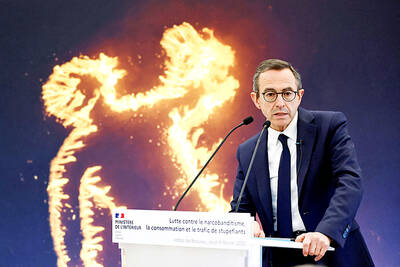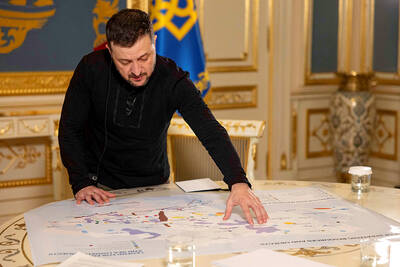Georgian President Mikhail Saakashvili rejected key elements of a German plan on Thursday aimed at ending a dangerous dispute with Russia over the separatist Georgian region of Abkhazia.
Saakashvili told reporters after talks with German Foreign Minister Frank-Walter Steinmeier that Georgia would not renounce the use of force in the conflict due to what he called incessant Russian provocations.
“As we speak there is a process of daily militarization of Abkhazia in front of the eyes of the international community,” he said. “If these kind of things continue to happen, talking about any kind of solutions will be very, very, very difficult.”
Steinmeier started a two-day trip in Georgia on Thursday that will also take him to Russia and Abkhazia in a bid to defuse a conflict that brought the region to the brink of war just months ago.
The German minister, whose country chairs the so-called UN Group of Friends of the Secretary General on Georgia, said the situation in Abkhazia was explosive and that “the spiraling violence must be stopped.”
He is aiming to thrash out a way forward based on a three-stage peace proposal drawn up by Berlin and presented to the three parties over the last week.
The first step of Berlin’s plan would entail an end to violence, confidence-building measures over the next year that could lead to the resumption of direct talks between Georgia and Abkhazia and the return of about 250,000 Georgian refugees to Abkhazia.
The second stage would involve developing joint reconstruction projects while the third and most difficult step would determine Abkhazia’s future status.
Steinmeier said he sought “a peaceful resolution based on the territorial integrity of Georgia” but said the West was deeply concerned about the recent escalation in the region.
“No one among us has any illusions. I am not here in the region to raise false hopes. But this deadlock must be broken,” he said.
German delegation sources said the talks with Saakashvili had been “difficult” but that the president had thanked Germany for its initiative and pledged Georgian cooperation in defusing the conflict.
Steinmeier spoke with UN chief Ban Ki-moon, US Secretary of State Condoleezza Rice and Russian Foreign Minister Sergei Lavrov about Abkhazia in the last week to prepare for the trip.
He was to travel yesterday to the region, where he was due to meet local leaders, before stopping in Moscow for talks with Lavrov and Russian President Dmitry Medvedev.
But speaking in Moscow on Thursday, Lavrov appeared to pour cold water on the German proposal, saying suggestions the agreement include the return of hundreds of thousands of Georgian refugees to Abkhazia were “unrealistic.”
And Abkhaz leader Sergei Bagapsh, whom Steinmeier was to meet yesterday, said this week he could not consider the plan, according to Russian news agencies.

RIGHTS FEARS: A protester said Beijing would use the embassy to catch and send Hong Kongers to China, while a lawmaker said Chinese agents had threatened Britons Hundreds of demonstrators on Saturday protested at a site earmarked for Beijing’s controversial new embassy in London over human rights and security concerns. The new embassy — if approved by the British government — would be the “biggest Chinese embassy in Europe,” one lawmaker said earlier. Protester Iona Boswell, a 40-year-old social worker, said there was “no need for a mega embassy here” and that she believed it would be used to facilitate the “harassment of dissidents.” China has for several years been trying to relocate its embassy, currently in the British capital’s upmarket Marylebone district, to the sprawling historic site in the

A deluge of disinformation about a virus called hMPV is stoking anti-China sentiment across Asia and spurring unfounded concerns of renewed lockdowns, despite experts dismissing comparisons with the COVID-19 pandemic five years ago. Agence France-Presse’s fact-checkers have debunked a slew of social media posts about the usually non-fatal respiratory disease human metapneumovirus after cases rose in China. Many of these posts claimed that people were dying and that a national emergency had been declared. Garnering tens of thousands of views, some posts recycled old footage from China’s draconian lockdowns during the COVID-19 pandemic, which originated in the country in late

French police on Monday arrested a man in his 20s on suspicion of murder after an 11-year-old girl was found dead in a wood south of Paris over the weekend in a killing that sparked shock and a massive search for clues. The girl, named as Louise, was found stabbed to death in the Essonne region south of Paris in the night of Friday to Saturday, police said. She had been missing since leaving school on Friday afternoon and was found just a few hundred meters from her school. A police source, who asked not to be named, said that she had been

BACK TO BATTLE: North Korean soldiers have returned to the front lines in Russia’s Kursk region after earlier reports that Moscow had withdrawn them following heavy losses Ukrainian President Volodymyr Zelenskiy on Friday pored over a once-classified map of vast deposits of rare earths and other critical minerals as part of a push to appeal to US President Donald Trump’s penchant for a deal. The US president, whose administration is pressing for a rapid end to Ukraine’s war with Russia, on Monday said he wanted Ukraine to supply the US with rare earths and other minerals in return for financially supporting its war effort. “If we are talking about a deal, then let’s do a deal, we are only for it,” Zelenskiy said, emphasizing Ukraine’s need for security guarantees